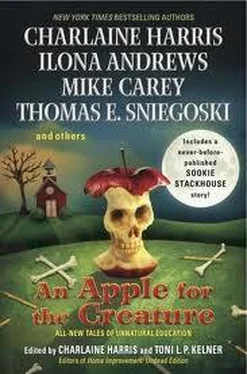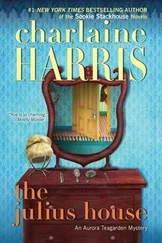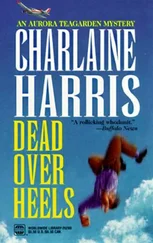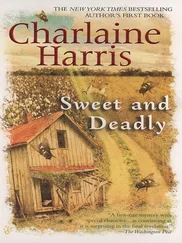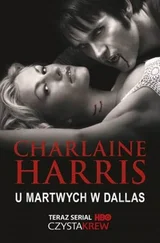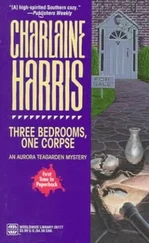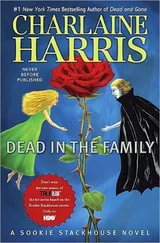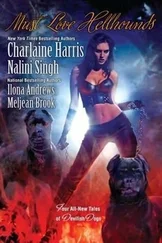“Well, I’m not staying. Can you tell me the way out?”
“Way out?” She looked puzzled.
“Yeah, the way out.”
“The way out?” she repeated, and she started to laugh.
“What’s wrong with you? Do you happen to have a cell phone on you so I can call my parents?”
“Cell phone?”
There was something seriously strange about this girl, or about this school, or both. “The office then, so I can call my parents to come and get me.”
“Nobody can come and get you, don’t you know that yet?” She pushed past me and almost ran to escape from me. I followed her down the stairs, staying close to the handrail because a tide of students was coming up.
“Out of the way, freak.” A boy in a letter jacket deliberately knocked into me. Luckily I held on or I’d have gone tumbling down.
This is like a nightmare, I muttered. Nobody will tell me how to get out. An exam with questions I can’t possibly answer. Then I stopped halfway down a flight of stairs, making those behind me barrel into me and start cursing. And I actually laughed. A nightmare. Of course. It was the classic nightmare that had plagued me all my life—the exam I was perennially late for. The exam with questions I couldn’t possibly answer. The strange building with no way out. That was it. I was dreaming. Now it all made sense. I’d been in some kind of accident and I was in a coma or something. And I’d wake up and everything would be back to normal again.
I finished the flight of steps with an almost jaunty tread. All I had to do was keep reminding myself that it was all a dream and I could handle anything. The students now seemed to be streaming along a different hallway.
“Where is everyone going?” I asked, hopeful that it might be the end of the school day and time to go home.
“Lunch, stupid,” a skinny freckled-faced boy said.
I followed along, although I didn’t feel hungry. The cafeteria was a huge subterranean room that echoed with noise, the clash and clatter of plates competing with the shouts of students. What’s more, it smelled terrible, like drains and boiled cabbage. I stood in line with the rest and inched my way toward a counter. Someone took a tray, so I did. A plate was banged down in front of me.
“Stew?” a helper behind the counter asked, and before I could answer, a great ladle of grayish, glutinous stuff was slopped into my plate. The helper gave me a toothless grin. “Vegetables?” she asked and dropped some gray boiled cabbage on top of the congealed mess.
“Wait,” I said, fighting back revulsion. “Is there a choice? Pizza maybe?”
The toothless grin widened. “Do you want it or not?”
I was pushed forward to where an old woman sat at a cash desk. “Five dollars,” she said.
“Five dollars? For this—” I went to say “crap,” then swallowed down the word at the last second. Then I remembered. “I don’t have my purse with me.”
“No matter. Put it on your tab, Miss Weinstein.”
How did they all know my name with all these thousands of students?
I carried my tray and looked around for a place to sit. Hostile stares or stupid giggles greeted me. I found an empty table far in a corner and sat down. I’d really have to do something about the way I looked. If this was a dream, I’d dream myself better looking. Better still, I’d dream Sally Ann into my dream and she could help me get back to my real self. I sat alone at that table and thought wistfully of Sally Ann, the first real friend I ever had. The only one who cared about me when I was a fat, clueless freshman and other kids picked on me or teased me. If it hadn’t been for her, I’d never have changed. I might not even have lived because when she came into my life I was seriously thinking of suicide. I’d started reading up on how many pills it takes to kill a person and I’d begun stealing my mother’s sleeping pills and my dad’s heart medication. Then she’d arrived and suddenly everything was fine.
“Hey, you.” A figure loomed over me. She was a gorgeous blonde, wearing a cheerleading outfit. “You’re sitting in my seat.”
“I didn’t realize we had assigned seats,” I said.
Her friends had come up behind her now, more cheerleaders and a couple of jocks in letter jackets. They burst out laughing.
“Are you totally clueless?” the blonde said. “This is the table we want and so you move. Got it?”
“Why should I have to move?” My fighting spirit had returned.
“Because we say so and we count and you’re nothing. Go on, beat it.”
“And if I won’t move?”
“I do this,” the girl said and before I could dodge she grabbed my head and rammed it down into my plate. Hot rancid fat went up my nose and I coughed and gagged. I fought to sit up as she held me down.
“Let her up, Tracy. Or she might die,” one of the other girls said and they roared with laughter.
The girl released me. “Got the message?” she said. “Go on, get lost.”
I got to my feet, wiping my eyes with my hand because I didn’t seem to have a napkin.
“You guys need to learn that bullying is not acceptable,” I said. “I’m going right now to report you to the principal and to make an official complaint.” I looked around, noticing that the cafeteria had become suspiciously quiet and that other kids were watching us. I turned to them. “What’s wrong with this place?” I demanded. “Don’t you realize that it’s so much nicer if we all get along? If we can’t be kind to each other in a school, in a community—what chance do nations ever have to live in peace because the whole of society is at war. Gangs, cliques, police brutality—what do they achieve except to make one person feel superior and others angry and inadequate?”
There was dead silence and the thought struck me that I’d made this speech before. I saw myself on a podium and the crowds were cheering and applauding. “I made this speech when I was running for Congress,” I said and even as the words came out I realized how ridiculous they sounded. The kids burst out laughing. I was about to go and find a bathroom that wasn’t inhabited by a wolf pack when someone near me called out, “Hey, Joshua! Dave’s looking for you.”
And it was as if I’d been struck by lightning. Dave. That name meant something to me—I’d been married to Dave and our baby son had been named Joshua. Suddenly I saw it all clearly—the apartment on the Upper East Side and the sun streaming in through the window with the view of Central Park and Dave saying, “It’s no use. It’s not working, Amy. You’re married to your ambition, not to me.” Then he put a hand on my shoulder. “It was never the same after Joshua died, was it?”
I stepped out into a deserted hallway, digesting this vision. I wasn’t really in high school. I was grown up and I’d been married and Dave had left me because Joshua had died and he couldn’t handle it. And I was a successful lawyer who was running for Congress. And I wore high heels and designer suits and had my hair styled by the best stylist in the Village. And I remembered the accident now—driving too fast because I was late and the van that came unexpectedly from my left. . . .
A hand grabbed my shoulder. “The principal wants to see you,” a voice said. “This way.”
“Fine,” I thought. What could the principal do to me? I’d tell her she was only a figment of my imagination and pretty soon I’d wake up.
Down the stairs we went. It was hot and stuffy down here and it crossed my mind to wonder why the principal chose this part of the school for her office. The boy who had been escorting me knocked on a door. It read, “Ms. Fer. Principal.”
“Enter,” said a voice.
“The girl you wanted, Ms. Fer,” the boy said and shoved me inside. Ms. Fer was sitting at a polished mahogany desk. She looked like an older version of me—immaculately dressed in a black suit and white blouse, hair streaked with gray but perfectly cut, face still unlined, gold pin in her lapel, long red fingernails.
Читать дальше
